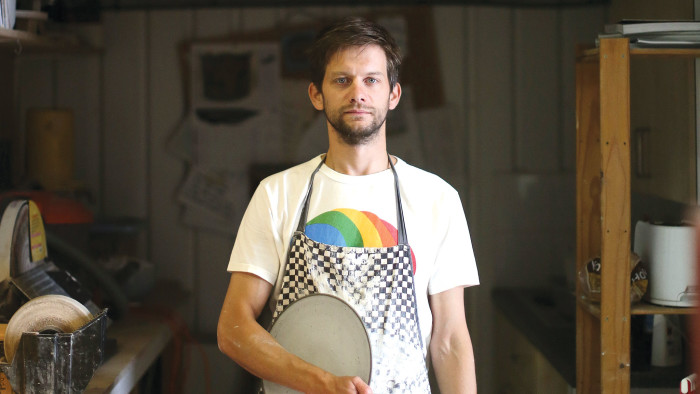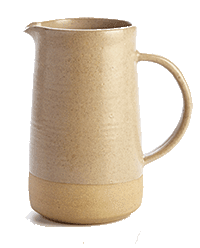Ceramics: design on a plate

Simply sign up to the Life & Arts myFT Digest -- delivered directly to your inbox.
Good restaurants have always used fine crockery. But in this new age of dining, a surreptitious lift of the dinner plate may not reveal a traditional hallmark such as Villeroy & Boch or Royal Limoges. Instead you’re likely to notice an indecipherable squiggle, rudimentary stamp or, quite possibly, nothing at all.
These marks of independent ceramicists express an increasing trend for restaurants to commission their own tableware. Naine Woodrow, who produces stoneware and ceramics at the North Street Potters collective in south London, says: “I used to have to convince chefs that [bespoke tableware] was a good thing to have. These days they come in already convinced.”
Woodrow has worked in ceramics for more than 30 years, and has long supplied pieces for the private dining room at Michel Roux Jr’s Le Gavroche. More recently, she has been commissioned by other well-regarded London restaurants such as Simon Rogan’s Fera at Claridge’s, The Dairy, Trinity, Newman Street Tavern and Mayfair’s Coya.
The designs are firmly Woodrow’s. Dan Cox, executive chef at Fera, says: “We seek control over every detail in all of Simon’s restaurants, including the tableware. So we find artisans and craftspeople in Britain to help us in everything we do. With Naine, it was very much ‘This is what I do, I can bend but I’m not going to change much.’” Woodrow was commissioned to make Fera’s charger plate – the first thing every guest sees. “There’s a beautiful single-serve tea infuser and cup set, side plates and bowls too,” says Cox.

East London ceramicist Owen Wall is in the early stage of his career. But since working with Isaac McHale, chef at the celebrated Shoreditch restaurant The Clove Club, he has found his work in demand from many more restaurants. Elliot’s in Borough Market and another Shoreditch restaurant, Lyle’s, have both commissioned pieces. “I try to come up with something different to suit each place,” he says. The experience has refined his aesthetic: “Like a lot of people, I’m inspired by the modern crafted looks of Japan, Sweden and Denmark. In many ways my style is developing as I work on these projects. It’s been a massive learning curve.”
Wall works through physical iterations of ideas before settling on and agreeing a finished product with the restaurant. He then uses a mould and a “jigger” machine to fashion the required form each time. Three firings ensure that the (often dramatic) glaze stands up to use in a professional kitchen. Producing in the volume required by restaurants is hard for a one-man operation.
Yet the handmade bespoke option is not expensive relative to other high-end tableware. It’s accessible for home cooks too: Woodrow’s studio doubles as a shop, where retail clients can purchase crockery at the same rate as restaurants. Another young designer, Billy Lloyd, has created a range for East London wine bar Verden, whose owners have made the collection available to their customers. Lloyd retails his products through the Conran Shop and Mayfair design curators The New Craftsmen, with whom Wall is also in talks.

Driven by an obsession with detail, chefs make good collaborators for ceramicists. “Why invest in and have clever little design features in the kitchen, bar, fixtures and fittings and not the crockery?” asks James Lowe, chef and co-owner of Lyle’s. “The plates Owen has made for us are plain but interesting upon closer inspection. Which is similar to our food. It looks simple but if you delve a little deeper, you find there’s a lot to it.” There’s an emotional connection as well. “Chefs get it, they’re craftspeople too” is a common refrain. It was interesting to hear Cox compare the handmade plates with the white dishes used at Fera for the à la carte service. “I would definitely veer towards the handmade ones given the choice. That goes for when I cook at home too. What I have is made by someone, means something.”
North Street Potters, 24 North Street, London SW4 0HB (northstreetpotters.com); The New Craftsmen, 34 North Row, London W1K 6DG (thenewcraftsmen.com); the Conran Shop has stores in Marylebone, Chelsea and worldwide (conranshop.co.uk)
Photographs: Matthew Booth; Charlie Bibby
Comments